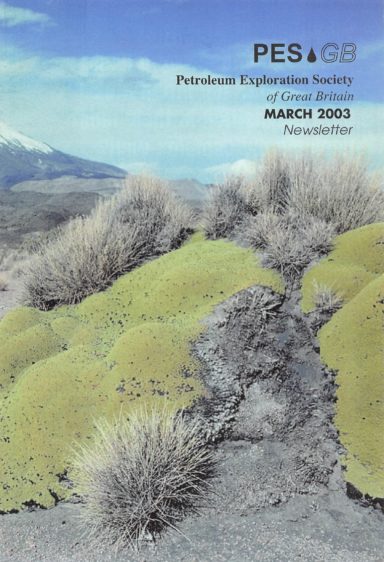PESGB March 2003
A Changing UKCS, Data Release and the Role of the PESGB
The PESGB has always been an integral part of the UK E&P community, and it is my hope that this will continue to be the case. For the past several decades it has played an important role as a social and networking organisation in addition to its educational (i.e. conference organising) role. This is confirmed by the fact that our membership nearly always increases during downturns in the industry.
At these times those of our membership who have been given the “opportunity to reflect on their future careers from the comfort of their own home” seek information about opportunities that might be available to them from other members who might not have been given a similar chance for reflection.
I think we can all see that there is a fundamental change taking place in the UK E&P business, as a result the make up of our membership has slowly changed over the years. Many more of our members are now engaged in activity in the international arena. Many more work for contracting and service companies. Many more are now self-employed or members of informal alliances. So it
would seem that it is now a significant minority of our members who are employed directly in oil companies exploring on the UKCS.
As an aside, it is interesting to see how many of the more active companies in the UK are Canadian; Talisman, CNR, Petro-Canada and my own company EnCana. What do they see that some others don’t? My own view is that they have seen what happened in Canada in the 80’s. Then, the Western Canadian Sedimentary Basin was judged to be highly mature and many of the majors and larger independents withdrew or significantly scaled down their presence to focus on greener pastures with larger upside and more romance (albeit often perceived romance, or the result of “Lemmingitis”). These changes. however, presented opportunities for a number of smaller, and some may argue, more entrepreneurial companies to flourish, and significant E&P businesses were built in an area that was allegedly played out.
So back to my favourite topic. Data Release: a subject, which raises much passion and discussion about the nature and future of the UKCS. As cochair of a PILOT sub-sub- sub committee. I experienced this passion and resistance to change at first hand. Quite simply the UKCS is changing: the tax increases on our industry in 2002 confirmed this in no uncertain terms. The Government saw that as an industry we were producing oil in a fiscally highly favourable environment but much of our reinvestment in finding new oil (as opposed to recovering more of what we had already found) was taking place outside the UK. Thus, I am sure that Gordon saw us as an easy target for raising much needed revenue .
Unless we attract new companies, encourage new start -ups or re-invigorate those already here, the future does not look rosy. Gone are the days when all data was quite rightly guarded almost as a state secret to maximise commerical advantage in a basin that was not always fully understood. Now the time has come to be more open with information for the benefit of all concerned.
Existing players need to put their models and maps into context, no longer can we afford to undertake keyhole exploration. Potential new entrants need to be able to assess UK opportunities quickly and cheaply. Many cannot afford to establish a UK office from the outset, let alone find the resources to staff and evaluate opportunities prior to investment here. Individuals who have novel play concepts or are aware of overlooked plays or prospects need access to data to help them develop a business case for promoting these ideas. The PESGB has always played an indirect role in helping this tight information flow a little more freely, usually at the Masons or the Guinea on Tuesday evenings.
Perhaps the time is now right for us to play a more direct role. Access to basic data (as opposed to knowing it exists, through UK Deal) is still restrictive, and will continue to be so until we fully establish a National Data Archive and develop a process to simplify and standardise access. Membership of CDA is not inexpensive and tends to be limited to operators and larger service and data brokers. Access to this database or similar for our members own use is something I think we should try and encourage. To this end I am exploring ways in which the PESGB might become a member of CDA, and then provide data cost effectively to its members so they can have the tools to actively participate in the changes that are already upon us.
Simply put, if we can increase activity in the UKCS, it will benefit everyone concerned, and I for one would like the PESGB to be at the forefront of supporting these changes.


